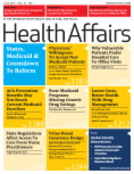Higher Fees Paid to US Physicians Drive Higher Spending for Physician Services Compared to Other Countries
Higher health care prices in the United States are a key reason that the nation’s health spending is so much higher than that of other countries. Our study compared physicians’ fees paid by public and private payers for primary care office visits and hip replacements in Australia, Canada, France, Germany, the United Kingdom, and the United States. We also compared physicians’ incomes net of practice expenses, differences in financing the cost of medical education, and the relative contribution of payments per physician and of physician supply in the countries’ national spending on physician services. Public and private payers paid somewhat higher fees to US primary care physicians for office visits (27 percent more for public, 70 percent more for private) and much higher fees to orthopedic physicians for hip replacements (70 percent more for public, 120 percent more for private) than public and private payers paid these physicians’ counterparts in other countries. US primary care and orthopedic physicians also earned higher incomes ($186,582 and $442,450, respectively) than their foreign counterparts. We conclude that the higher fees, rather than factors such as higher practice costs, volume of services, or tuition expenses, were the main drivers of higher US spending, particularly in orthopedics.
